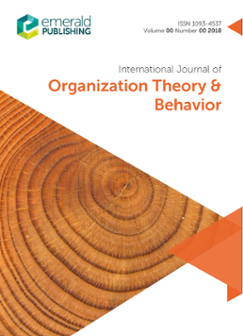Table of contents
The new contingent workforce: Examining the bridge employment options of mature workers
Kenneth S. ShultzThe dual forces of an increasing dependency ratio and lower labor market participation on the part of mature individuals does not bode well for the American and European…
Rethinking concepts, concerns, and collaboration in interorganizational relationships
Lark in S. Dudley, Jeffrey SuttonBecause increased attention is being given to the problems and possibilities associated with interdependence among organizations and sectors in theory and practice, this…
Important but largely unanswered questions about accountability in contracted public human services
J. Steven Ott, Lisa A. DiekeContracting-out for human services has become preferred public policy at all levels of government. This service delivery policy choice has important implications for…
Improving the quality of public administration research on nonprofits: Dismantling the three-sector model
kathryn Cheever, Nancy T. Kinney, Pete WolfeDoes the three sector model of public (government), private (business), private/nonprofit still have validity? Did it ever? The following article examines the definitions…
Persistence of organizational identity within interorganizational relationships
B. Paul, S. LarkinAs the emphasis on interorganizational relationships increases, one fear expressed by nonprofits is that interorganizational cooperation would lead them away from their sense of…
Treating development networks seriously: What public managers should know
Steven A. Maclin, Lawrence F. KellerIn recent years, local governments have concentrated on revitalizing their local economies through economic development policy, which raises a number of important political and…
Public virtual organizations
Thomas D. Lynch, Cynthia E. Lynch, Richard D. WhiteThis article argues that the virtual organization model (also called web-enterprises by the former U.S. Secretary of Labor, Robert Reich in The Work of Nations) can meet the…
Motivation and evaluation in environmental management networks
Lisa S. NelsonInterorganizational collaboration is increasingly seen as an important process in environmental management. The new paradigm of managing places as ecosystems requires increasing…
Doubt and deliberation: Making strategy in ontario’s food bank system
Alasdair RobertsDeliberation may be used by organizations or networks of organizations to manage the moral and technical uncertainties that are associated with threshold strategies - that is…
Spirituality and dialogue revisited
Richard D. WhiteThis essay introduces the second and final ethics symposium on spirituality and dialogue. The first symposium, edited by Thomas D. Lynch, Ph.D., focused on individual…
Searching for a collective ethos in interorganizational relationships
Larkin DudleyGlobalization accelerates the need to accommodate the ethical guidelines of different cultures, the subject of many of the papers in the symposium. In a similar manner, the…
The U.S. public dialogue on trade policy: An initial assessment
Laura nee R. GeriThere has been little public dialogue in the United States on the implications of the evident trend toward greater worldwide economic, social and political integration. This…
Beyond african humanism: Economic reform in post-independent zambia
Alex SekwatThis study examines distinctive economic reform measures pursued in post-independent Zambia and ethical problems which plagued the reform process. The study begins with a review…
The ethics of leadership trust
A. Carol RusawAccording to Exchange Theory, leaders and followers set goals and carry out actions by calculating interests, efforts required to achieve goals, and possible payoffs. Leaders and…
Spirituality in public service
Willa BruceThis paper argues that the deep moral values inherent in the world’s religious and spiritual traditions are both appropriate and needed in the public sector work place. It…

ISSN:
1093-4537Online date, start – end:
1998Copyright Holder:
Emerald Publishing LimitedOpen Access:
hybridEditor:
- Associate Professor Davide Secchi